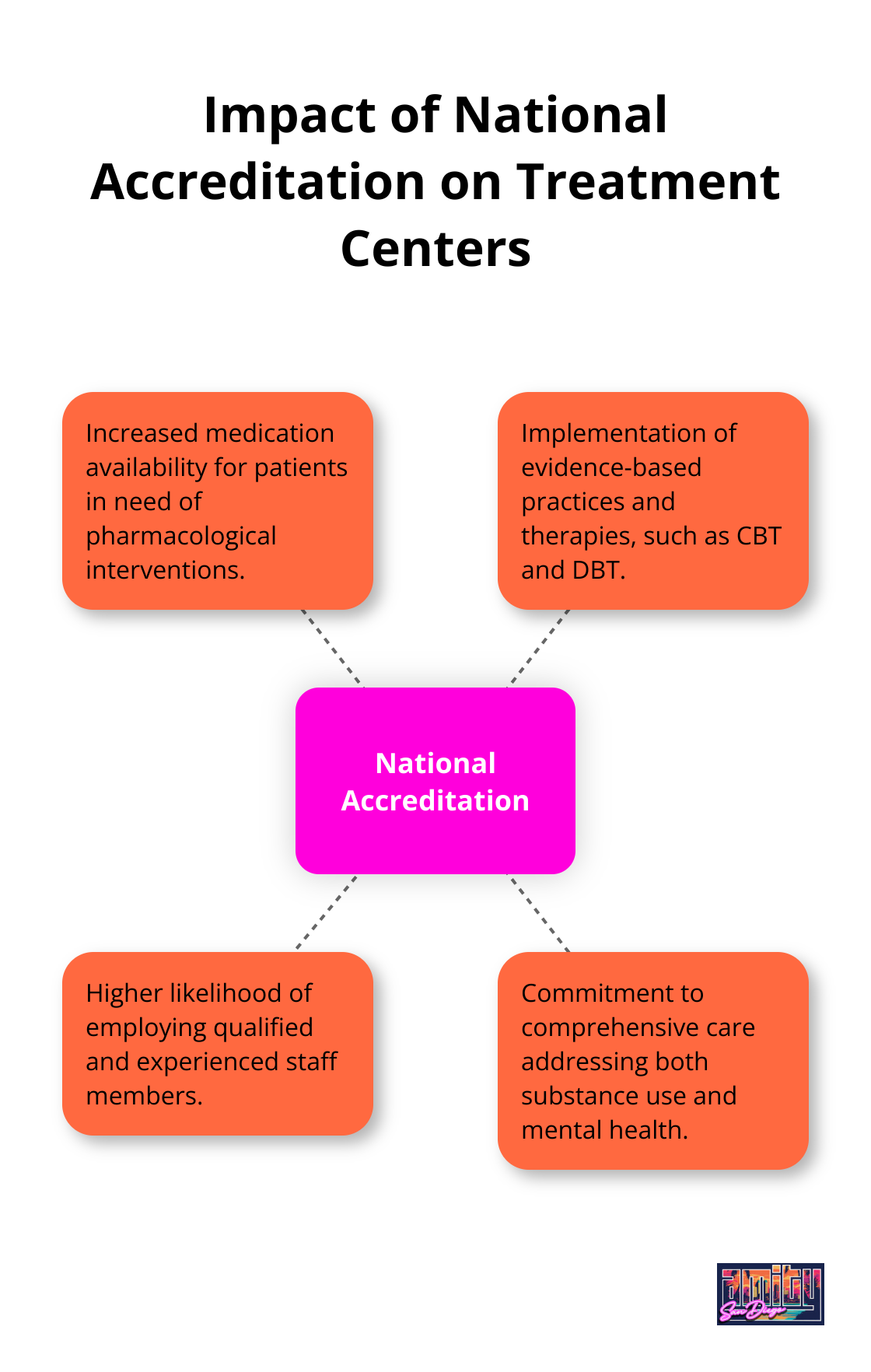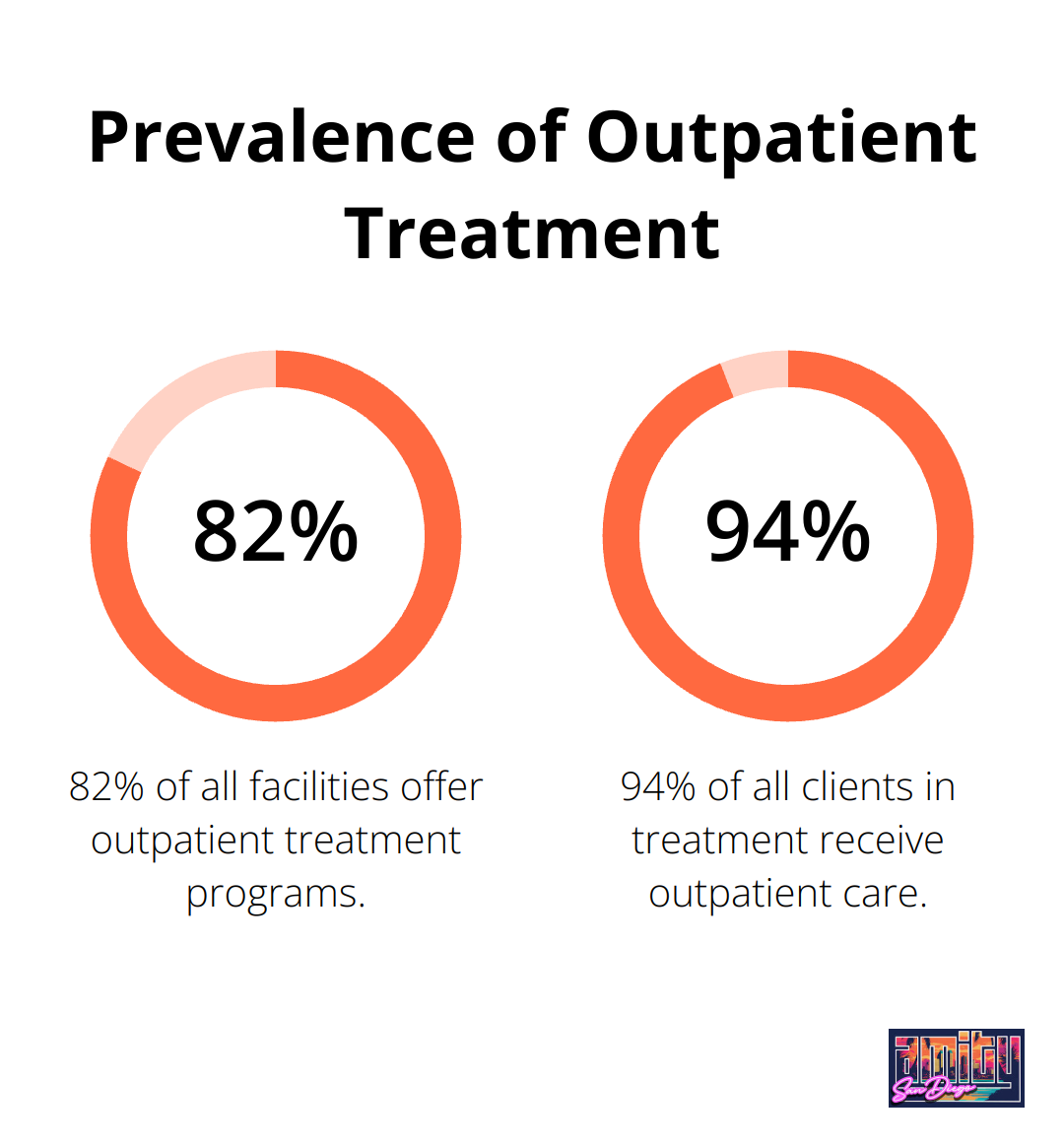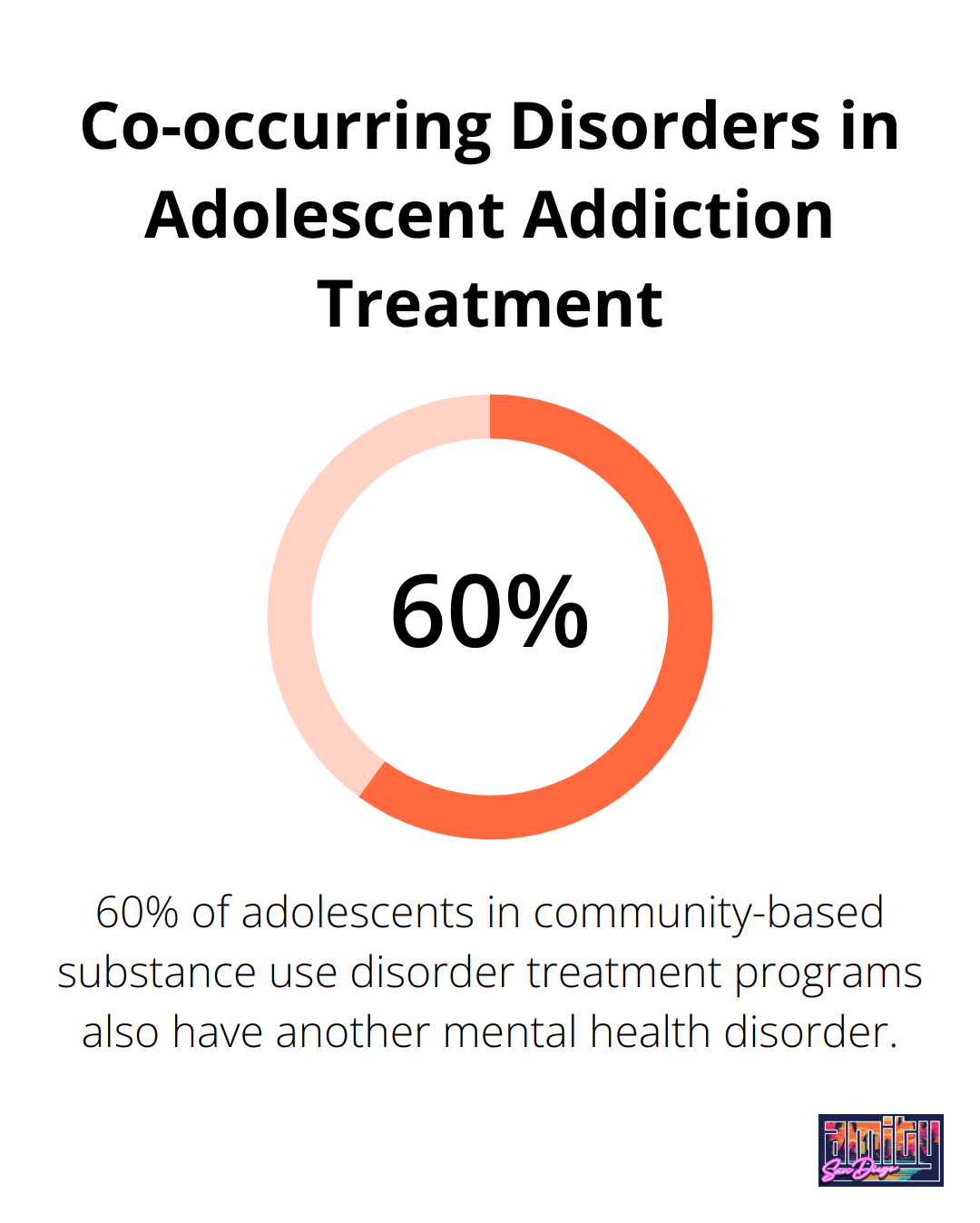Choosing the right addiction treatment center is a critical decision that can significantly impact recovery outcomes. At Amity San Diego, we understand the importance of finding a program that aligns with individual needs and preferences.
This guide will help you navigate the complex landscape of treatment centers, providing essential factors to consider and key information about different types of programs.
By evaluating the quality and offerings of various facilities, you’ll be better equipped to make an informed choice for yourself or a loved one seeking recovery.
What Matters Most in Addiction Treatment Centers
Accreditation and Evidence-Based Approaches
The cornerstone of quality addiction treatment lies in accreditation and evidence-based practices. National accreditation is positively associated with medication availability in treatment centers. These accreditations signal a commitment to proven treatment methods.
Effective treatment centers employ a variety of therapeutic approaches. Cognitive Behavioral Therapy (CBT), Dialectical Behavior Therapy (DBT), and Motivational Interviewing form the backbone of many successful programs. The National Institute on Drug Abuse highlights the effectiveness of combining behavioral therapies with medication (when appropriate) for optimal patient outcomes.

Qualified Staff and Personalized Care
The expertise of the treatment team plays a pivotal role in recovery success. Look for centers that boast a multidisciplinary staff, including different specialists involved in helping individuals along their road to recovery from drug or alcohol addiction. A low staff-to-client ratio (often seen in high-quality centers) allows for more personalized attention and tailored treatment plans.
Transparency about staff qualifications is essential. Reputable centers openly share their team’s credentials and experience. The Substance Abuse and Mental Health Services Administration (SAMHSA) underscores the importance of trained professionals in delivering effective treatment.
Comprehensive Services and Aftercare
Effective addiction treatment addresses more than substance use alone. Centers that offer dual diagnosis treatment for co-occurring mental health conditions provide a more holistic approach. Integrated treatment is effective in increasing the motivation for treatment amongst patients with anxiety and/or depression together with substance use disorders in outpatient settings.
Aftercare forms a critical component of long-term recovery. Strong programs offer comprehensive aftercare planning, including support group referrals, ongoing therapy options, and relapse prevention strategies. The National Institute on Drug Abuse reports that extended periods of care correlate with improved outcomes, making programs with long-term support particularly valuable.
Location and Insurance Coverage
While a picturesque setting might seem appealing, the quality of care should take precedence over amenities. However, a peaceful environment can contribute positively to the healing process. Consider whether a local treatment or some distance away might better serve your recovery journey.
Understanding the financial aspects of treatment proves essential. Check if the center accepts your insurance and clarify potential out-of-pocket costs. Many quality treatment centers work with major insurance providers to increase accessibility. Don’t let financial concerns deter you from seeking help – options often exist to make treatment more affordable.
The journey to selecting the right addiction treatment center requires careful consideration of these key factors. As we move forward, let’s explore the various types of addiction treatment programs available to meet diverse needs and preferences.
Navigating Treatment Options for Addiction Recovery
At Amity San Diego, we recognize that effective addiction treatment isn’t one-size-fits-all. The journey to recovery often involves a combination of approaches tailored to individual needs. Let’s explore the spectrum of treatment options available to those seeking help for substance use disorders.
Inpatient vs. Outpatient Care: Your Path to Recovery
The choice between inpatient and outpatient care depends on several factors, including addiction severity, home environment, and personal responsibilities. Inpatient treatment offers 24/7 care in a structured setting, which suits individuals with severe addictions or unstable living situations. Outpatient programs provide flexibility for those with work or family commitments.
The Substance Abuse and Mental Health Services Administration (SAMHSA) reports that outpatient treatment was offered by 82 percent of all facilities and was received by 94 percent of all clients in treatment. However, the National Institute on Drug Abuse (NIDA) emphasizes that longer treatment durations correlate with better outcomes, regardless of the setting.

The Essential Role of Detoxification
Detoxification often marks the first step in addiction treatment, especially for substances like alcohol, opioids, and benzodiazepines. Medical detox provides a safe environment to manage withdrawal symptoms under professional supervision. The American Society of Addiction Medicine (ASAM) states that medically managed detox can significantly reduce complication risks and increase the likelihood of continuing treatment.
Intensive Programs for Comprehensive Care
Partial Hospitalization Programs (PHP) and Intensive Outpatient Programs (IOP) bridge the gap between inpatient and traditional outpatient care. These programs offer structured treatment several days a week, allowing individuals to maintain some aspects of their daily lives while receiving intensive therapy.
A study in the Journal of Substance Abuse Treatment found that IOP participants showed significant improvements in substance use and psychosocial functioning (comparable to those in residential treatment).
Specialized Treatment Approaches
Many facilities now offer specialized programs tailored to specific populations or needs. For instance, trauma-informed care addresses the high prevalence of trauma among individuals with substance use disorders. The National Center for PTSD estimates that up to 80% of women seeking addiction treatment report lifetime histories of sexual or physical assault.
Gender-specific programs, LGBTQ+ focused treatment, and programs for professionals are becoming more prevalent, recognizing the unique challenges faced by different groups in recovery.
San Diego offers diverse addiction treatment San Diego options, reflecting the city’s commitment to addressing substance use disorders. From beachside residential facilities to community-based outpatient programs, the variety allows individuals to find a treatment setting that aligns with their recovery goals.
The selection of a treatment program should consider factors such as evidence-based practices, staff qualifications, and aftercare support. The most effective treatment plans often adapt as your needs change throughout the recovery process. As we move forward, we’ll examine how to evaluate the quality of addiction treatment centers to ensure you make the best choice for your recovery journey.
How to Assess Quality in Addiction Treatment
Success Measurement: Beyond Simple Statistics
Many centers boast high success rates, but it’s important to look deeper. The National Institute on Drug Abuse (NIDA) warns against relying solely on abstinence rates. Recovery is a complex, ongoing process. Quality centers track multiple outcome measures, such as improved quality of life, employment status, and reduced legal issues.
Ask potential treatment centers about their follow-up procedures. High-quality programs often conduct long-term outcome studies. They track clients’ progress for months or years after treatment. The Substance Abuse and Mental Health Services Administration (SAMHSA) recommends centers use standardized assessment tools to measure outcomes consistently.
The Essential Role of Aftercare
Effective addiction treatment doesn’t stop when you leave the facility. Recovery management checkups have consistently produced better substance use outcomes and quicker reentry into treatment during relapses than assessments without intervention. Look for centers that offer robust aftercare planning, including:
- Referrals to local support groups
- Ongoing individual or group therapy options
- Alumni programs for continued connection
- Relapse prevention education and strategies
Centers that maintain strong connections with sober living homes and outpatient providers show a commitment to long-term recovery support.
Family Involvement: A Key to Lasting Recovery
Family support can significantly impact treatment outcomes. The National Association for Children of Addiction (NACoA) emphasizes the importance of family education and therapy in breaking generational cycles of addiction. Quality treatment centers often offer:
- Family therapy sessions
- Educational workshops for loved ones
- Resources for family members’ self-care
- Guidance on creating a supportive home environment
Ask potential centers about their family programs and how they integrate family support into the treatment process.
Personalization: The Hallmark of Effective Treatment
Cookie-cutter approaches rarely work in addiction treatment. The American Society of Addiction Medicine (ASAM) stresses the importance of individualized care plans. High-quality centers conduct thorough assessments and regularly adjust treatment based on progress.
Try to find programs that offer a variety of evidence-based therapies and can tailor treatment to your specific needs. This might include specialized trauma therapies, cultural competence for diverse populations, or gender-specific programming.
Addressing Co-Occurring Disorders
Approximately 60% of adolescents in community-based substance use disorder treatment programs also meet diagnostic criteria for another mental health disorder. Centers equipped to treat dual diagnosis offer integrated care, addressing both addiction and mental health simultaneously.
Ask about the qualifications of staff members. Quality dual diagnosis programs employ mental health professionals alongside addiction specialists. They should provide comprehensive psychiatric evaluations and medication management (when necessary).

Final Thoughts
Selecting the right addiction treatment center requires careful consideration of evidence-based practices, qualified staff, and comprehensive aftercare support. Treatment centers that offer personalized care plans and address co-occurring disorders often provide the most effective path to recovery. Factors such as accreditation, types of therapies, and the qualifications of the treatment team (along with location and insurance coverage) play a significant role in the decision-making process.
Recovery is possible, and seeking help marks a brave first step towards a healthier life. We at Amity San Diego offer compassionate, evidence-based care tailored to individual needs. Our approach combines medical expertise with holistic healing methods to address both physical and emotional aspects of addiction.
Take action today to start your journey to recovery. Contact a trusted treatment center, speak with a healthcare professional, or reach out to a recovery specialist. Your future self will appreciate this life-changing decision, which can help you reclaim your life and create a brighter future free from addiction.

